21 May 2018 | Digital Freedom, European Union, Germany, News and features, Russia, United States
[vc_row][vc_column][vc_single_image image=”85524″ img_size=”full” alignment=”center”][vc_column_text]For around six decades after WWII ideas, laws and institutions supporting free expression spread across borders globally. Ever more people were liberated from stifling censorship and repression. But in the past decade that development has reversed.
On April 12 Russian lawmakers in the State Duma completed the first reading of a new draft law on social media. Among other things the law requires social media platforms to remove illegal content within 24 hours or risk hefty fines. Sound familiar? If you think you’ve heard this story before it’s because the original draft was what Reporters Without Borders call a “copy-paste” version of the much criticized German Social Network law that went into effect earlier this year. But we can trace the origins back further.
In 2016 the EU-Commission and a number of big tech-firms including Facebook, Twitter and Google, agreed on a Code of Conduct under which these firms commit to removing illegal hate speech within 24 hours. In other words what happens in Brussels doesn’t stay in Brussels. It may spread to Berlin and end up in Moscow, transformed from a voluntary instrument aimed at defending Western democracies to a draconian law used to shore up a regime committed to disrupting Western democracies.
US President Donald Trump’s crusade against “fake news” may also have had serious consequences for press freedom. Because of the First Amendment’s robust protection of free expression Trump is largely powerless to weaponise his war against the “fake news media” and “enemies of the people” that most others refer to as “independent media”.
Yet many other citizens of the world cannot rely on the same degree of legal protection from thin-skinned political leaders eager to filter news and information. The Committee to Protect Journalists (CPJ) has documented the highest ever number of journalists imprisoned for false news worldwide. And while 21 such cases may not sound catastrophic the message these arrests and convictions send is alarming. And soon more may follow. In April Malaysia criminalised the spread of “news, information, data and reports which is or are wholly or partly false”, with up to six years in prison. Already a Danish citizen has been convicted to one month’s imprisonment for a harmless YouTube video, and presidential candidate Mahathir Mohammed is also being investigated. Kenya is going down the same path with a draconian bill criminalising “false” or “fictitious” information. And while Robert Mueller is investigating whether Trump has been unduly influenced by Russian President Putin, it seems that Putin may well have been influenced by Trump. The above mentioned Russian draft social media law also includes an obligation to delete any “unverified publicly significant information presented as reliable information.” Taken into account the amount of pro-Kremlin propaganda espoused by Russian media such as RT and Sputnik, one can be certain that the definition of “unverified” will align closely with the interests of Putin and his cronies.
But even democracies have fallen for the temptation to define truth. France’s celebrated president Macron has promised to present a bill targeting false information by “to allow rapid blocking of the dissemination of fake news”. While the French initiative may be targeted at election periods it still does not accord well with a joint declaration issued by independent experts from international and regional organisations covering the UN, Europe, the Americans and Africa which stressed that “ general prohibitions on the dissemination of information based on vague and ambiguous ideas, including ‘false news’ or ‘non-objective information’, are incompatible with international standards for restrictions on freedom of expression”.
However, illiberal measures also travel from East to West. In 2012 Russia adopted a law requiring NGOs receiving funds from abroad and involved in “political activities” – a nebulous and all-encompassing term – to register as “foreign agents”. The law is a thinly veiled attempt to delegitimise civil society organisations that may shed critical light on the policies of Putin’s regime. It has affected everything from human rights groups, LGBT-activists and environmental organisations, who must choose between being branded as something akin to enemies of the state or abandon their work in Russia. As such it has strong appeal to other politicians who don’t appreciate a vibrant civil society with its inherent ecosystem of dissent and potential for social and political mobilisation.
One such politician is Victor Orban, prime minister of Hungary’s increasingly illiberal government. In 2017 Orban’s government did its own copy paste job adopting a law requiring NGOs receiving funds from abroad to register as “foreign supported”. A move which should be seen in the light of Orban’s obsession with eliminating the influence of anything or anyone remotely associated with the Hungarian-American philanthropist George Soros whose Open Society Foundation funds organisations promoting liberal and progressive values.
The cross-fertilisation of censorship between regime types and continents is part of the explanation why press freedom has been in retreat for more than a decade. In its recent 2018 World Press Freedom Index Reporters Without Borders identified “growing animosity towards journalists. Hostility towards the media, openly encouraged by political leaders, and the efforts of authoritarian regimes to export their vision of journalism pose a threat to democracies”. This is something borne out by the litany of of media freedom violations reported to Index on Censorship’s Mapping Media Freedom, which monitors 43 countries. In just the last four years, MMF has logged over 4,200 incidents — a staggering array of curbs on the press that range from physical assault to online threats and murders that have engulfed journalists.
Alarmingly Europe – the heartland of global democracy – has seen the worst regional setbacks in RSF’s index. This development shows that sacrificing free speech to guard against creeping authoritarianism is more likely to embolden than to defeat the enemies of the open society.[/vc_column_text][/vc_column][/vc_row][vc_row][vc_column width=”1/2″][vc_single_image image=”100463″ img_size=”full” onclick=”custom_link” img_link_target=”_blank” link=”http://www.freespeechhistory.com”][/vc_column][vc_column width=”1/2″][vc_column_text]
A podcast on the history of free speech.
Why have kings, emperors, and governments killed and imprisoned people to shut them up? And why have countless people risked death and imprisonment to express their beliefs? Jacob Mchangama guides you through the history of free speech from the trial of Socrates to the Great Firewall.[/vc_column_text][/vc_column][/vc_row][vc_row][vc_column][vc_basic_grid post_type=”post” max_items=”12″ style=”load-more” items_per_page=”4″ element_width=”6″ grid_id=”vc_gid:1526895517975-5ae07ad7-7137-1″][/vc_column][/vc_row]
23 Apr 2018 | Press Releases
A public art project and website celebrating dissent in Cuba and a collective of young bloggers and web activists who give voice to the opinions of young people from all over the Democratic Republic of Congo are among the winners of the 2018 Index on Censorship Freedom of Expression Awards.
The winners, who were announced on Thursday evening at a gala ceremony in London, also include one of the only human rights organisations still operating in Egypt and an investigative journalist from Honduras who regularly risks her life for her right to report on what is happening in the country.
Awards were presented in four categories: arts, campaigning, digital activism and journalism.
The winners are: Cuban art collective The Museum of Dissidence (arts); the Egyptian Commission for Rights and Freedoms (campaigning); Habari RDC, a collective of young Congolese bloggers and activists (digital activism); and Honduran investigative journalist Wendy Funes (journalism).
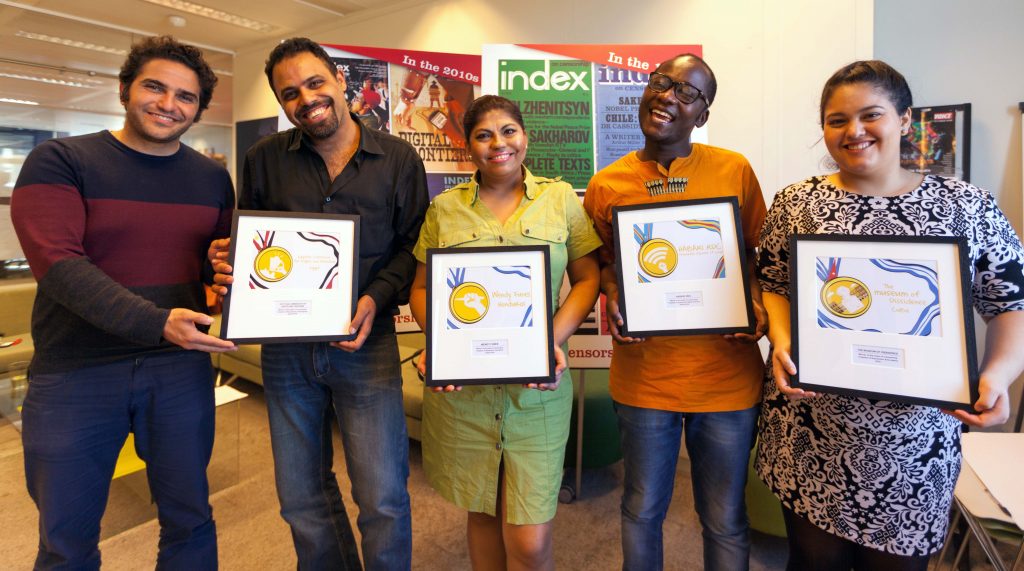
From right: Human rights defenders Mohamed Sameh and Ahmad Abdallah of 2018 Freedom of Expression Campaigning Award-winning Egypt Commission on Rights and Freedoms; 2018 Freedom of Expression Journalism Award-winning Honduran investigative journalist Wendy Funes; Congolese digital activist Guy Muyembe of 2018 Freedom of Expression Digital Activism Award-winning Habari RDC; Perla Hinojosa, Fellowship and Advocacy Officer at Index on Censorship, holds the 2018 Freedom of Expression Arts Award for Cuban arts collective Museum of Dissidence, who could not attend the Freedom of Expression Awards. (Photo: Index on Censorship)
“These winners deserve global recognition for their amazing work,” said Index on Censorship CEO Jodie Ginsberg. “Like all those nominated, they brave massive personal and political hurdles simply so that others can express themselves freely.”
Drawn from more than 400 public nominations, the winners were presented with their awards at a ceremony at The Mayfair Hotel, London, hosted by “stand-up poet” Kate Fox.
Actors, writers and musicians were among those celebrating with the winners. The guest list included The Times columnist and Chair of Index David Aaronovitch, BBC presenter Jonathan Dimbleby, comedian Shazia Mirza, social human rights activists Nimco Ali and Sara Khan, Serpentine Galleries CEO Yana Peel, poet Sabrina Mahfouz, Channel 4’s Lindsey Hilsum and more.
Winners were presented with cartoons created by Khalid Albaih, a Romanian-born Sudanese social media based political cartoonist who considers himself a virtual revolutionist.
Each of the award winners will become part of the fourth cohort of Freedom of Expression Awards fellows. They join last year’s winners — Chinese political cartoonist Rebel Pepper (arts); Russian human rights activist Ildar Dadin (campaigning); Digital collective Turkey Blocks (digital activism); news outlet Maldives Independent and its former editor Zaheena Rasheed (journalism) — as part of a world-class network of campaigners, activists and artists sharing best practices on tackling censorship threats internationally.
Through the fellowship, Index works with the winners – both during an intensive week in London and the rest of the awarding year – to provide longer term, structured support. The goal is to help winners maximise their impact, broaden their support and ensure they can continue to excel at fighting free expression threats on the ground.
This year’s panel of judges included Razia Iqbal, a journalist for BBC News, Tim Moloney QC, deputy head of Doughty Street Chambers, Yana Peel, CEO of the Serpentine Galleries, and Eben Upton CBE, a founder of the Raspberry Pi Foundation and CEO of Raspberry Pi.
Awards judge Eben Upton said: “”The ability to speak freely is a key foundation of democratic society and the rule of law: absent the ability to openly identify the abuse of power, extractive economic conditions, and exclusive political institutions, proliferate. This is why freedom of expression is so precious, and so often under attack from those in power.”
This is the 18th year of the Freedom of Expression Awards. Former winners include activist Malala Yousafzai, cartoonist Ali Ferzat, journalists Anna Politkovskaya and Fergal Keane, and Bahrain Center for Human Rights.
Ziyad Marar, President of Global Publishing at SAGE said: “The protection and promotion of free speech is a belief firmly entrenched within our values at SAGE. As both publisher of the magazine and sponsors of tonight’s awards, we are proud to support Index in their mission as they defend this right globally. We offer our warmest congratulations to those recognised and remain both humbled and awed by their inspirational achievements.”
Further details about the award winners are below.
For interviews with the award winners, who are in London until Friday 20 April, please contact Sean Gallagher at [email protected].
Photographs and other content related to the awards night will be available beginning 11am on Friday 20 April. Please contact Sean Gallagher at [email protected].
Index on Censorship is grateful for the support of the 2018 Freedom of Expression Awards sponsors: SAGE Publishing, Google, Private Internet Access, Edwardian Hotels, Vodafone, Vice News, Doughty Street Chambers and former Index Award-winning Psiphon.
Index on Censorship Freedom of Expression Awards 2018 – background on winners
Arts – The Museum of Dissidence (Cuba)
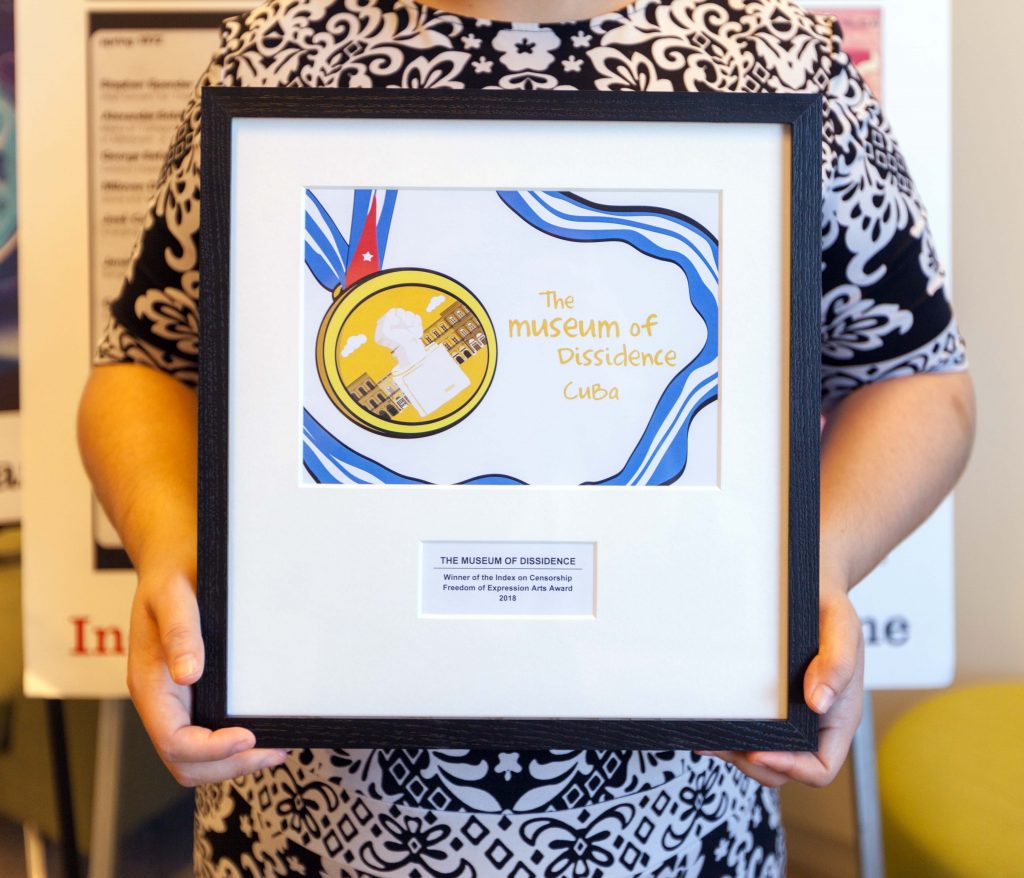
Perla Hinojosa, Fellowship and Advocacy Officer at Index on Censorship, holds the 2018 Freedom of Expression Arts Award for Cuban arts collective Museum of Dissidence, who could not attend the Freedom of Expression Awards. (Photo: Index on Censorship)
The Museum of Dissidence is a public art project and website celebrating dissent in Cuba. Set up in 2016 by acclaimed artist Luis Manuel Otero Alcántara and curator Yanelys Nuñez Leyva, their aim is to reclaim the word “dissident” and give it a positive meaning in Cuba. The museum organises radical public art projects and installations, concentrated in the poorer districts of Havana. Their fearlessness in opening dialogues and inhabiting public space has led to fierce repercussions: Nuñez was sacked from her job and Otero arrested and threatened with prison for being a “counter-revolutionary.” Despite this, they persist in challenging Cuba’s restrictions on expression.
CEO of Serpentine Galleries and 2018 Freedom of Expression Award judge Yana Peel said: The Museum of Dissidence in Cuba is incredibly important for the safe space that it is providing for unsafe ideas. It is a tremendous platform through which the great artists of Cuba bring Cuba to the global stage.”
Profile
Campaigning – The Egyptian Commission for Rights and Freedoms (Egypt). Award supported by Doughty Street Chambers
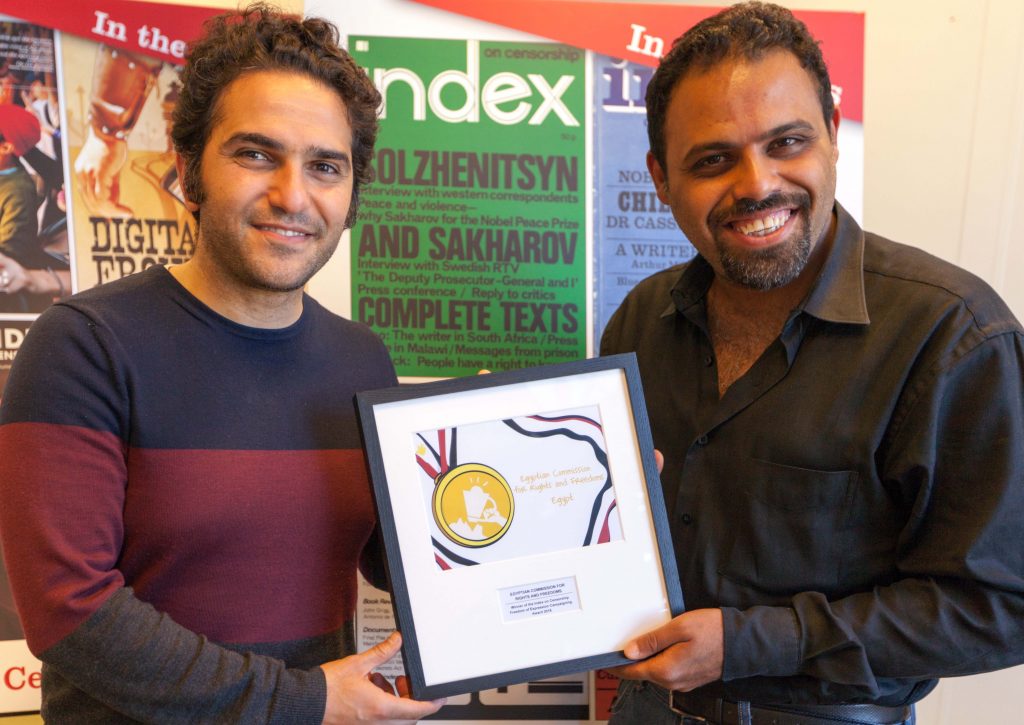
Human rights defenders Mohamed Sameh and Ahmad Abdallah of 2018 Freedom of Expression Campaigning Award-winning Egypt Commission on Rights and Freedoms. (Photo: Index on Censorship)
The Egyptian Commission for Rights and Freedoms is one of the few human rights organisations still operating in a country which has waged an orchestrated campaign against independent civil society groups. Egypt is becoming increasingly hostile to dissent, but ECRF continues to provide advocacy, legal support and campaign coordination, drawing attention to the many ongoing human rights abuses under the autocratic rule of President Abdel Fattah-el-Sisi. Their work has seen them subject to state harassment, their headquarters have been raided and staff members arrested. ECRF are committed to carrying on with their work regardless of the challenges.
CEO of Raspberry Pi and Freedom of Expression Awards 2018 judge Eben Upton said: “In an environment when organisations have had to step back or disappear altogether, they’ve managed to keep going and just that persistence over a period of time in a difficult environment is inspiring”.
Profile
Digital Activism – Habari RDC (Congo). Award sponsored by Private Internet Access
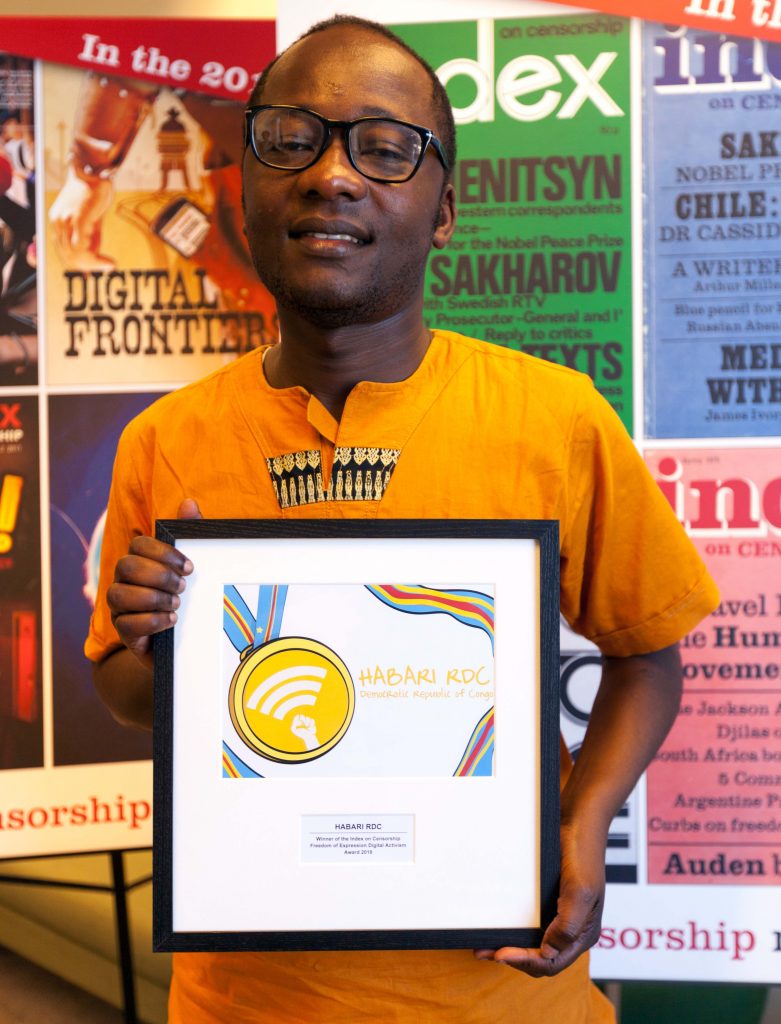
Congolese digital activist Guy Muyembe of 2018 Freedom of Expression Digital Activism Award-winning Habari RDC (Photo: Index on Censorship)
Launched in 2016, Habari RDC is a collective of more than 100 young Congolese bloggers and web activists, who use Facebook, Twitter and YouTube to give voice to the opinions of young people from all over the Democratic Republic of Congo. Their site posts stories and cartoons about politics, but it also covers football, the arts and subjects such as domestic violence, child exploitation, the female orgasm and sexual harassment at work. Habari RDC offers a distinctive collection of funny, angry and modern Congolese voices, who are demanding to be heard.
Journalist and 2018 Freedom of Expression Awards judge Razia Iqbal aid: “They’re doing something which is actually very hard to do, which is make sure that the future generation know what’s happening in their own country, are willing to speak to each other about it and be active politically”.
Profile
Journalism – Wendy Funes (Honduras). Award sponsored by VICE News
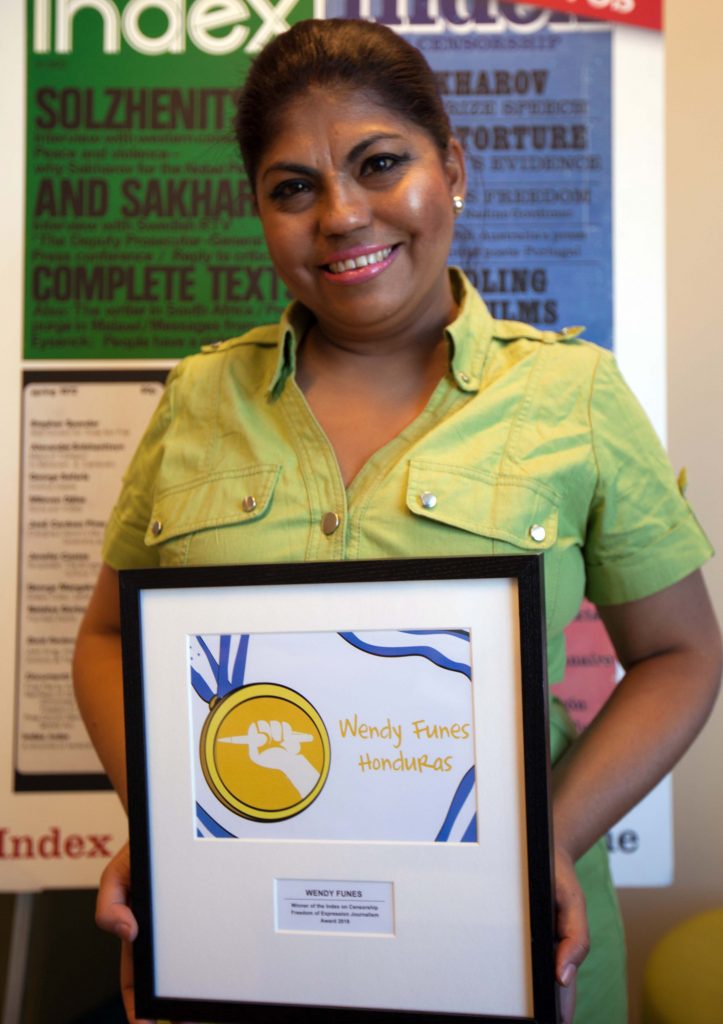
2018 Freedom of Expression Journalism Award-winning Honduran investigative journalist Wendy Funes. (Photo: Index on Censorship)
Wendy Funes is an investigative journalist from Honduras who regularly risks her life for her right to report on what is happening in the country, an extremely harsh environment for reporters. Two journalists were murdered in 2017 and her father and friends are among those who have met violent deaths in the country – killings for which no one has ever been brought to justice. Funes meets these challenges with creativity and determination. For one article she had her own death certificate issued to highlight corruption. Funes also writes about violence against women, a huge problem in Honduras where one woman is killed every 16 hours.
Journalist and 2018 Freedom of Expression Awards judge Razia Iqbal QC said: “She is courageous in the face of death threats. She is courageous in the face of censorship. She is courageous just in terms of getting up every morning and saying I’m going to continue to do what I am doing.”
Profile
ABOUT THE FREEDOM OF EXPRESSION AWARDS AND FELLOWSHIP
The Index on Censorship Freedom of Expression Awards recognise those individuals and groups making the greatest impact in tackling censorship worldwide. Established 18 years ago, the awards shine a light on work being undertaken in defence of free expression globally. Often these stories go unnoticed or are ignored by the mainstream press. Through the fellowship, Index works with the winners – both during an intensive week in London and the rest of the awarding year – to provide longer term, structured support. The goal is to help winners maximise their impact, broaden their support and ensure they can continue to excel at fighting free expression threats on the ground.
ABOUT INDEX ON CENSORSHIP
Index on Censorship is a UK-based nonprofit that campaigns against censorship and promotes free expression worldwide. Founded in 1972, Index has published some of the world’s leading writers and artists in its award-winning quarterly magazine, including Nadine Gordimer, Mario Vargas Llosa, Samuel Beckett and Kurt Vonnegut. Index promotes debate, monitors threats to free speech and supports individuals through its annual awards and fellowship program.






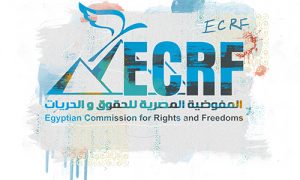 The Egyptian Commission for Rights and Freedoms is one of the few human rights organisations still operating in a country which has waged an orchestrated campaign against independent civil society groups. Egypt is becoming increasingly hostile to dissent, but ECRF continues to provide advocacy, legal support and campaign coordination, drawing attention to the many ongoing human rights abuses under the autocratic rule of President Abdel Fattah-el-Sisi. Their work has seen them subject to state harassment, their headquarters have been raided and staff members arrested. ECRF are committed to carrying on with their work regardless of the challenges.[/vc_column_text][/vc_column][/vc_row][vc_row][vc_column][awards_fellows years=”2018″][vc_basic_grid post_type=”post” max_items=”12″ style=”load-more” items_per_page=”4″ element_width=”6″ grid_id=”vc_gid:1524475725322-09fdf4b1-d760-4″ taxonomies=”24136, 24135″][/vc_column][/vc_row]
The Egyptian Commission for Rights and Freedoms is one of the few human rights organisations still operating in a country which has waged an orchestrated campaign against independent civil society groups. Egypt is becoming increasingly hostile to dissent, but ECRF continues to provide advocacy, legal support and campaign coordination, drawing attention to the many ongoing human rights abuses under the autocratic rule of President Abdel Fattah-el-Sisi. Their work has seen them subject to state harassment, their headquarters have been raided and staff members arrested. ECRF are committed to carrying on with their work regardless of the challenges.[/vc_column_text][/vc_column][/vc_row][vc_row][vc_column][awards_fellows years=”2018″][vc_basic_grid post_type=”post” max_items=”12″ style=”load-more” items_per_page=”4″ element_width=”6″ grid_id=”vc_gid:1524475725322-09fdf4b1-d760-4″ taxonomies=”24136, 24135″][/vc_column][/vc_row]